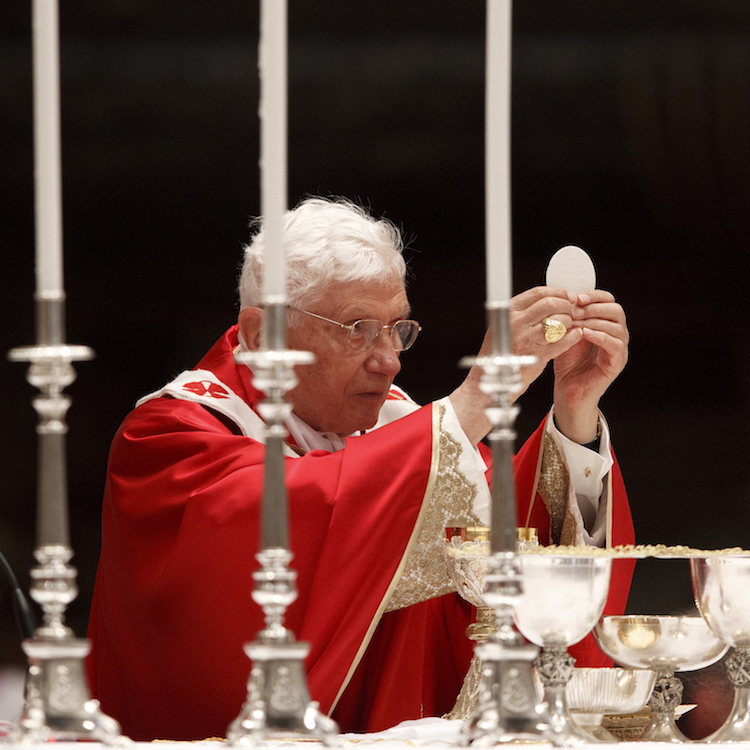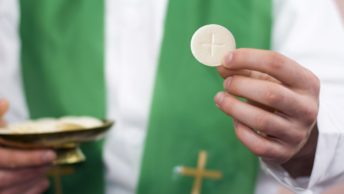Mothers can tell you that the hardest time to keep kids under control is right before dinner. They run around, fight and fidget, get restless and edgy. Why? That’s human nature on full display in young, growing bodies. So mothers hurry to put in front of their children a favorite dish: macaroni and cheese, spaghetti and meatballs, burgers and fries, or everyone’s top choice: pizza. And peace sets in.
In his Letter to the Ephesians (4:30-5:2), St. Paul offers us a very appealing picture of a community properly fed (Eucharist-fed) by Mother Church. Peace sets in: All bitterness, fury, anger, shouting, and reviling must be removed from you along with all malice.
Every weekend, we are drawn to our Church because we feel the need to be fed Jesus’ spiritual food. We long to be sealed by the Holy Spirit of God for the day of redemption. Every weekend we seek divine solutions to put an end to our turmoil, hurts, fears, disheartening experiences or simply to taste the joy of being at peace with ourselves, with our God, with our brothers and sisters.
At times, the turmoil is all inside us. Fear, due to some very real, visible threats to our safety, could be so overwhelming that, like Elijah (1 Kings 19:4-8), we might wish to die, if for nothing else but to relieve the pain that would have become unbearable.
Other times the turmoil, the unrest, is caused by the cruelty of other people, by their greed, by their callousness or insensitivity.
Or we might feel crushed by the system, by forces too far superior to our own, as with the Government severely restricting or taking away our religious freedom and forcing us to trample on our conscience.
There are also times when we cannot identify the source of our restlessness or our anxiety, yet it is all so very real, very intense, very disconcerting.
Finally, in many cases, we want to be here because we do not know how to trust, to understand, to turn a blind eye, to accept, to forgive or to be reconciled with one of those people God has placed in our life.
No matter what the source of our pain might be, no matter what the origin of our turmoil, Jesus introduces himself to us, for the umpteenth time, in a most unusual fashion. He claims, once again, to be the food that came down from heaven, the food meant to bring about harmony, reconciliation, cooperation, kindness, genuine love and peace. Could this be the time we truly take his words to heart?
The first time Jesus introduced himself as the Bread of life (John 6); the first time he declared that he would give his people his own flesh to eat, the reaction was one of ridicule, dismay and vociferous disapproval.
However, before we accuse the people of Capernaum of being foolish and obtuse in dismissing Jesus and his unbelievable claim, we should keep in mind that this is precisely the risk that God runs repeatedly as, in his boundless and mad love, he lowers himself to become totally accessible to his people—as accessible as food is!
Over the last 2000 years nothing really significant has changed. Nowadays we can be just as foolish, just as obtuse or just as unfazed as those people were.
The gospel passage from John (6:41-51) develops the mystery of Jesus as the Bread from heaven, challenges us with a troubling crescendo that is designed to make sure that we never get used to the Eucharist or that we allow his words to give us much pause. The conflict of emotions ensuing from Jesus offering himself for spiritual consumption vis-à-vis the obstinate resistance of those who were to benefit from this heavenly nourishment, warns us never to approach the table of the Sacrament to feed on the Gift of the Father the way we would approach fine but ordinary, earthly food.
The first stage of this conflict of emotions was first triggered by Jesus’ preposterous claim of being the Bread that came down from heaven, when everyone in his audience knew, for certain, that he was the son of the carpenter from the obscure hamlet of Nazareth nearby. Practically all Protestants and, alas, some Catholics too, suffer from the result of a similar sort of emotional conflict: How can a humble wafer, even after the words of institution, (the same words of Christ at the Last Supper) turn into the real Body of Jesus Christ? We all know that it is a simple flat piece of unleavened bread. It has to be only a symbol of the real Body, right? How can the Church insists that Christ is present in that wafer with his body and blood, soul and divinity?
The emotional conflict increases in our heart when Jesus, far from softening the initial shock, adds that his Bread from heaven possesses the same attributes that are uniquely and exclusively of God: “Whoever eats this Bread will live forever.” If his previous statement gave us pause, (maybe for the first time in our life), now, after this second statement, we are forced to try to see how even the ordinary, daily choices we make are consistent or not with the Bread of immortality. The immediate conclusion we might reach upon the briefest reflection on this outlandish statement could be that we have indeed gotten used to the Eucharist and eaten the Body of Christ as if it were something “nice” but not much different from ordinary, earthly food.
So, the inescapable conclusion would be that our faith needs a huge mental and emotional boost because these words have yet to sink all the way to the bottom of our hearts and shape our decision-making process. By God’s design, this second claim of Christ must make us keep our hope of immortality firmly alive and unshaken even as our daily experience deals routinely with countless people reaching the end of their biological life.
Yet the emotional conflict continues with this crescendo that takes our spiritual breath away.“The bread that I will give is my flesh for the life of the world.” We realize how spontaneous the murmuring, the grumbling, and the shock of those Jews from Capernaum must have been. Ours has to be at least as loud and as persistent as theirs because, with every passing day, we gain an ever-increasing awareness of how ordinary, humble, frail, easily-hurting, even embarrassingly banal our flesh is. And, with the only exception of being sinless, we are assured that the flesh of our God is, in all ways, the same as ours! Yet this is the flesh that, in the power of the Holy Spirit, nourishes, strengthens, sustains, heals all our wounds, and is the solemn pledge of immortality.
Before this threefold challenge we can continue to murmur; we can keep feeding on it without much emotional stirring inside, or we can choose to be well fed with that Bread, at peace and sealed by the Holy Spirit of God for the day of redemption.








